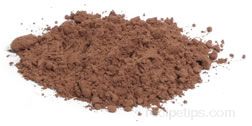Natural cocoa powder has a sharp, acidic flavor that may make some recipes slightly harsher tasting, but generally is not very noticeable. When added as an ingredient to various recipes, it will add a pale brown color to the food. Dutch cocoa is a richer variety that has been produced with the addition of baking soda, an alkali, which helps to reduce and neutralize the natural acidity of the cocoa, making it more soluble and less bitter. When added to a recipe, this cocoa powder provides a richer flavor and a deeper brown coloring to the food being prepared. It is generally best not to substitute either cocoa for the other unless baking powder or baking soda is required in the recipe.
Spanish cocoa or Mexican hot chocolate made from Spanish cocoa beans is also richer and thicker than the American variety of hot chocolate made with traditional cocoa powder. To create rich tasting puddings with this bean, add cornstarch or rice starch to thicken the cocoa beverage into a pudding-like texture.
When preparing foods with cocoa, use the cocoa powder suggested in the recipe. If the recipe contains a leavener such as baking powder or baking soda, make sure not to substitute another cocoa powder different from the one suggested in the recipe or the food being prepared may not rise or bake properly. To substitute cocoa for baking chocolate, use 1 tablespoon of oil or shortening added to 3 tablespoons of cocoa. This mixture equals 1 square or 1 ounce of unsweetened baking chocolate. Cocoa is traditionally light or dark brown in color when brewed into a liquid. However, other processed varieties of cocoa may be colored and used to celebrate various seasonal holidays such as orange Cocoa for fall or Halloween festivities and red and green for Christmas celebrations. The color is derived from FDA approved food coloring such as red #40 and yellow #6 which are added by food processors to make an orange color.









